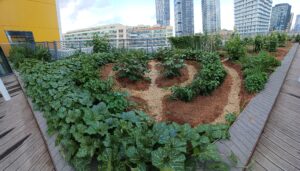🛠️ Chapter 4: Relevance to Practice
30 4.6: Food Insecurity and Food Justice

The manifestations of white supremacy and Anti-Black Racism (ABR) in dietetics have profound consequences for Black communities in Canada, exacerbating existing health disparities and contributing to socioeconomic challenges. These systemic issues not only limit access to culturally competent care but also undermine efforts toward achieving food sovereignty and equitable health outcomes (Etowa, Beagan, & Runnels, 2020).
Food justice is an essential aspect of addressing systemic inequities within our food systems. It encompasses advocacy for dignity, equity, and community engagement, focusing on addressing food insecurity through community-based solutions. Food justice involves confronting systems of oppression, including patriarchy and misogyny, and understanding the intersectionality of various forms of economic injustice. Urban farming and culturally appropriate practices are vital components in promoting economic equity and ensuring that all communities have access to nutritious and culturally relevant foods.
Video 4.4: Co-Chair of the Toronto Youth Food Policy Council and an Urban Farmer and Equity Coordinator at Food Share Toronto, Sheldomar Elliott, discusses the connection between the health of the Canadian Black community and systems of oppression. Sheldomar’s insights highlight the importance of food sovereignty and food justice for marginalized communities, addressing the intersection of food systems and systemic barriers.
Keywords: Advocacy, Community-Based Initiative, Culturally Appropriate Food, Economic Injustice, Equity, Food Insecurity, Food Justice, Intersectionality, Misogyny. Patriarchy, Systems of Oppression.
Stop and Reflect
For further reading on the connection between the land and the Black community, take a look at Amnesty International’s work in Black and Indigenous Solidarity Against Systemic Racism.
To further explore the role of community-based initiatives and food justice in addressing these inequities, we present a video featuring Nicole Austin, Black-led Programs Coordinator at Toronto Metropolitan University’s Urban Farm. Nicole discusses her work in advancing Black food sovereignty, highlighting the importance of collaboration and knowledge-sharing in creating sustainable, community-led solutions to health disparities.
Video 4.5: Food justice advocate, environmentalist and geographer, Nicole Austin, makes the connection between dietetics, food sovereignty, and Black health.
Stop and Reflect
Additional Resources:
For further exploration, visit the Black Food Sovereignty Initiative: Black Food Sovereignty Initiative. Read about the impact of the Urban Farm on the community: Urban Farm Brings Black Community Together Through Food and explore the Confronting Anti-Black Racism in Toronto initiative: Toronto Action Plan to Confront Anti-Black Racism (PDF).
